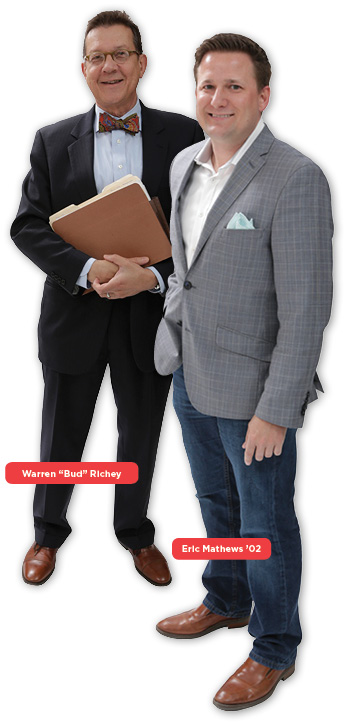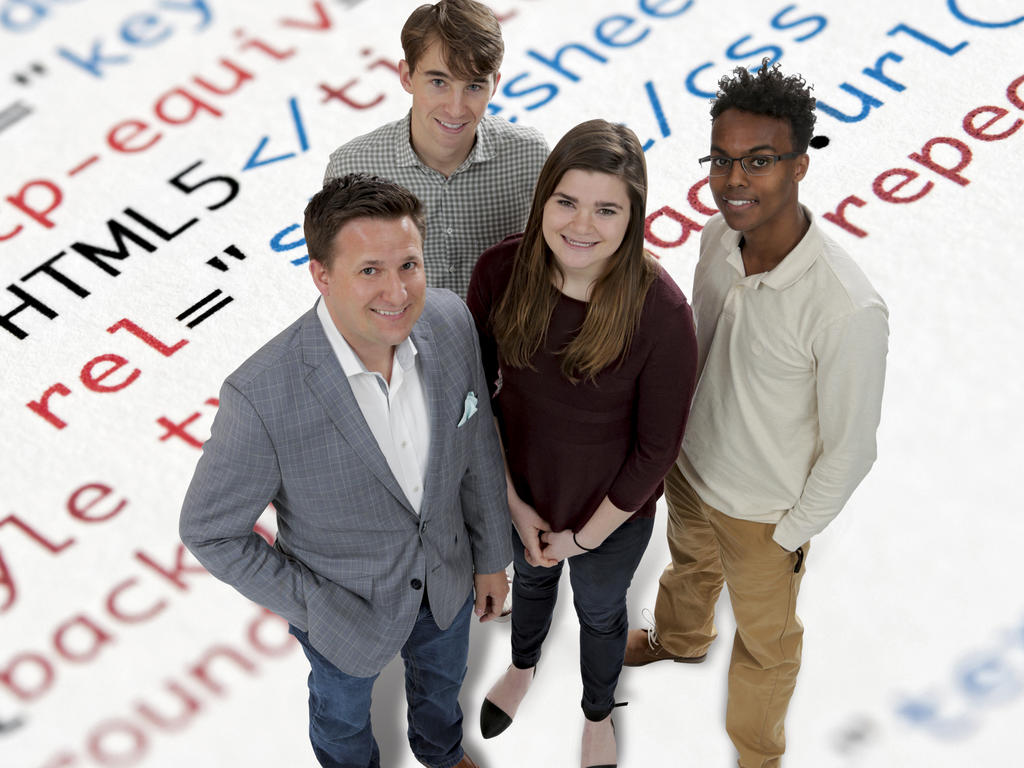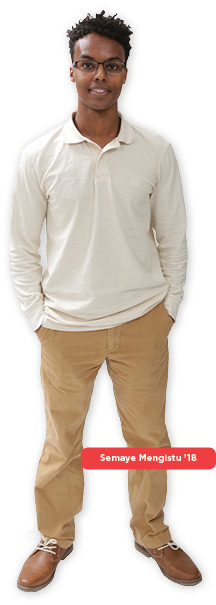
Outside Barret Library, a light layer of white covered the Rhodes campus. Inside Barret 051, a cavernous space typically reserved for group meetings, teams of students huddled together, heads down, diligently working on laptops.
For much of the campus, Friday, Jan. 22, 2016, had been a gray, freezing snow day. But for these teams, and a few others working elsewhere on and off campus, a heated hackathon competition was under way, fueled by an entrepreneurial spirit undeterred by inclement weather.
The inaugural event that night, known as RhodesHacks 0, was just the latest student-driven entrepreneurial initiative to take place at Rhodes, where a growing team of community startup and traditional business leaders, faculty, administrators, and students aim to attract a new breed of student to the college. At the heart of it all lies the advantage Rhodes has in its Memphis location.
“Memphis is an entrepreneurial city—Fred Smith, Kemmons Wilson, and Clarence Saunders to name a few of our business leaders,” says President William E. Troutt. “They connect with our students to inspire them to take on challenges we wouldn’t have imagined. The experience that comes from being in a great city liberates our students to explore, and, as a result, we see our students soar.”
“The big winner could be Memphis,” says Eric Mathews ’02, CEO and founder of Start Co., a Memphis startup accelerator. “If we get it right, Memphis has a chance to make a difference in terms of attracting talent and new people. Memphis has a chance to really do things well, and Rhodes can be a part of that with our talented students who come from all over.”
IDEA
The idea to bring a hackathon to Rhodes College began in the summer of 2015 as I thought about ways I could impact the school from my position as Rhodes Entrepreneurship Club (E.club) president. Rhodes is a top-notch liberal arts school with really talented students across academic disciplines. I knew if I could plan a hackathon, students would be interested and participate at a high level.— Sam Reid ’16 blog entry

Ideas. They are the origin of all creativity. To come to fruition, they require support and nurturing. That is the foundation Rhodes is building, both inside and outside the classroom, for a growing group of students, some of whom already operate their own businesses. Given that the new generation of college students has grown up in an entrepreneurial business climate, the timing for Rhodes could not be better.
“I think the students have picked up the mantle of leadership and started running,” says Warren “Bud” Richey, associate vice president for External Programs. “We are doing what we can to put them in a position to succeed. Part of it may be not stifling their imagination and squashing their belief that this can happen.”
Traditional business classes at Rhodes already make it a popular major, accompanied by a highly respected graduate program in accounting. What makes the current climate somewhat different is the more narrowly focused definition of entrepreneurship as the creation of something innovative or unique.
“Innovation is such a big part of it,” says Dr. Pam Church, chair of the Department of Commerce and Business. “Innovation is the synergy between ideas and people coming together to create a unique product
or service.”
“I normally think about entrepreneurship as thinking about something new and making a new product and thinking about ways to market that product—new and different ways to solve problems,” says Dr. Betsy Sanders, associate professor of computer science.
Such was the challenge of the hackathon. Teams came up with original product ideas in three categories: technology, design, and service. The students worked through the night developing their product and then presented the outcome to a panel of judges. All winning entries—an overall winner and a winner from each of the three categories—relied on technology, although the purpose of the end-product was not necessarily technological.
Most hackathons are purely technological. RhodesHacks 0 was different. Its categories were a nod to the breadth of learning available at a liberal arts college.
PROBLEM SOLVERS
While Rhodes is a small college without an engineering program or much of a graduate school presence, it has a rapidly growing computer science department and lots of students interested in the tech industry. Tech has not typically been a destination for many Rhodes grads but I think that’s changing (this is also a national trend, as tech industry expands and others shrink). Additionally, Rhodes students are skillful problem solvers using their studies in various subjects to craft innovative solutions. Enter RhodesHacks.— Sam Reid ’16 blog entry
One thing those involved in the campus entrepreneurial ecosystem agree on is that, with a tiny push from Richey and Mathews, students have led the charge. Several students formed the E.club in 2013 and, under its auspices, have hosted an annual business plan competition and now the Rhodes hackathon. The club’s events center on teams developing a business plan while the hackathon focuses on creating a new product.
“It turns out liberal arts students are really good at this,” says Sam Reid ’16. “Especially those who have studied computer science. The business plan competition brought me into this world of entrepreneurship. I would otherwise never have been interested.”
Sanders agrees: “Employers see the Rhodes students’ creativity and the links that they can make. That’s why it’s fun to teach at a liberal arts college. Students see the world in different ways. They think creatively.”
Richey attributes much of the energy behind the college’s entrepreneurial efforts to Reid, who arrived at Rhodes planning to become an attorney. After the first business plan competition, he was hired by a startup working out of Mathews’ Memphis-based business incubator firm Start Co. He spent last summer in Palo Alto, CA, working for that company and was recruited by another startup, 500 Miles, to handle the growth sector of their firm.
Success is arriving early for other students, as well. Thomas Threlkeld ’16 identified the gender gap in computer coding and co-launched Camp Codette to teach middle-school girls to write computer programs, along with Sanders and Haley Adams ‘15. Threlkeld combined a $5,000 Clarence Day fellowship, awarded to him as one of Rhodes’ Clarence Day Scholars, and a $10,000 Google Ignite CS grant to fund the camp in summer 2015.
With the grants that Threlkeld secured, the co-founders were able to buy all of the equipment for the camp. This included computers and robots, among other necessities. They were also able to hire staff to help with the workload. Additionally, as part of the grant, Google required Threlkeld and Adams to attend a meeting with the other nine nationwide grant winners to talk about their individual programs. “Google had us all get in a room together, talk about our experiences, and also share our results.”
After those trips, the team started building the curriculum for the camp. The camp focused on app development, 3D printing, and robotics. In addition to securing funding for the entire camp, Threlkeld also taught the robotics courses. Keely Hicks ’16, Chelsey Thompson ‘15, Elizabeth Zak, Lily Gray, and Adams worked the camp and helped run it.
With Camp Codette under his belt, Threlkeld joined Will Cobb ’18 and Luke Dulske ’18 to win the overall prize at RhodesHacks 0.

Sarah Baumann ’16 might be the epitome of the liberal arts entrepreneur. She is an urban studies major and an illustrator. She operates an Etsy site that features her artwork (see more about Baumann in our Student Spotlight column on page 10). In addition she works with a student team running SheBuilds, a program that empowers young girls in science, technology, engineering, and math.
It isn’t uncommon to see students riding skateboards to class around the Rhodes campus. Kirkwood Vangeli ’17 and his business partner Zak Roberts took their love of skateboarding and started Fluxus Skateboard Co., which makes quality skateboard decks. Proceeds from sales are invested into video projects about the skateboard community. The company’s first video, Aesthetics, premiered in February at Crosstown Arts. Fluxus has a social media presence on Instagram, Facebook, and YouTube.
SPIRIT
I was thoroughly impressed with all the teams’ final products, which included 3D streaming from desktop to mobile, a mobile music mixing app, a mobile meetup and streaming app for bands best described as SoundCloud mixed with Tinder, a reflective prism that displays 3D objects from websites into the physical space, and a comprehensive life management mobile app. Rhodes students worked through the night to produce high-quality projects in the spirit of competition, innovation and hacking. This was exciting to see.— Sam Reid ’16 blog entry
Are you a roaming musician, visiting a city and hoping to gig a little with the local talent? There’s an app for that! Thanks to Threlkeld and his team members, One Night Band can connect you to area musicians wherever you go. The app is currently awaiting approval by Apple for inclusion in the Apple store.
The winning product in the technology category of the hackathon was software that generates a prism in which objects from websites can be viewed in three dimensions. Hackathon team members were Jake Owens ’17, Alex Abdo ’16, Dan Lanza ’17, and Semaye Mengistu ’18. As with any such creation, the coolness factor—and this product has a high coolness factor!—only generates market value if it has a purposeful use. That’s where Rhodes’ new Intro to Entrepreneurship class comes in.
“Who is your customer?” asks Mathews of the class of nearly 20 students divided into six teams to develop a product idea that originated with one of their classmates. “Be specific. Entrepreneurship is all about subtraction. Know your customer.”
With those instructions the six teams, including one comprised of Owens, Connor Marshall ’19, and Jack Bennett ’19, begin to further refine their ideas. For the class, the team is targeting classrooms as the customer base for the 3D prism, being marketed under the company name Edu-Flection. Teachers can use the software to show complex objects such as atoms three-dimensionally so that students can better grasp how atoms work.
Mengistu, meanwhile, is working with a team that is developing an app called Pop a Squat, the brainchild of New Orleans native Katherine Bolyard ’19. Designed with Mardi Gras in mind, the app connects participants in the city’s annual festivities to homes along the parade routes that are willing to offer up their bathrooms for a $5 fee.
EXPOSURE
With this being the first RhodesHacks, not everything ran perfectly, but what was most important to me did go according to plan. What was most critical in my opinion was for Rhodes students to produce projects that would be competitive at the nation’s top hackathons like MHacks. I knew a lot of the students who participated beforehand and knew what level of hacking they were capable of. They certainly came through. I was also encouraged by the participation of students with no prior exposure to hackathons.— Sam Reid ’16 blog entry
Students in the Intro to Entrepreneurship class watched a video called the Hero’s Journey, based on Joseph Campbell’s monomyth, a common series of steps all heroes take. “The hero’s journey is not complete until you return to the community and share what you’ve learned. That is your responsibility as an entrepreneur,” Mathews tells the class.
Mathews should know. His team-teaching of the class with Richey is the latest way that he shares his successes with his alma mater. He has been working with Rhodes students on campus and through Start Co. for several years. For the students, it’s all about getting exposed to area business leaders.
Expanding that exposure is the goal of a CEO class led by President William E. Troutt. The once-weekly class features a prominent business leader who talks with students about leadership.
“Part of the appeal we have at Rhodes, unlike other liberal arts colleges, is that we have assets to tap into beyond our campus. We have incredible assets in Memphis,” Troutt says. “Being in a city also helps us fully utilize the student talent we have.”
Business leaders from all fields speak to the class—Grizzlies President of Business Operations Jason Wexler; former St. Jude CEO and Business Director Dr. William E. Evans; RaceTrac CEO Allison Moran; and Hardy Bottling President and CEO Carolyn Hardy.
VISION
The vision for RhodesHacks is a premier hackathon in the southern United States. I think we’ve laid the groundwork and are well on our way. Next year, we hope to have students from other schools participating in RhodesHacks. In two years, we hope the event is nationally known and attended by students from across the country.— Sam Reid ’16 blog entry
Eleanor Roosevelt said, “The future belongs to those who believe in the beauty of their dreams.” Allowing students to dream—to ideate—and to develop those sparks of innovation is itself a process of beauty.
“What I’ve come to realize,” says Church, “is that a lot of entrepreneurship is about supporting people as they think creatively and put their ideas into action—making that idea seem feasible.”
The timing seems right. Memphis’ creative community is thriving. The city ranked third nationwide in a realtor.com listing of locations where millennials are putting down roots. An Inc.com article named Memphis “the edgiest startup hub in the U.S.” The city ranks ninth on the SmartAsset list of cities with the lowest startup costs. WalletHub ranked Memphis the seventh-best city in which to start a business. Forbes ranked the city in the top 10 of tech locations and named Tennessee as among the top states attracting women entrepreneurs. While Memphis isn’t Silicon Valley, that’s OK. Because it doesn’t want or need to be.
“Most of the world looks like Memphis and not Silicon Valley,” notes Mathews. In terms of positioning itself to be a player in the startup world, the city—together with Rhodes—is doing the right things.
It takes vision to craft a support network like the one at Rhodes. It takes commitment. It takes energy.
“The next big thing could come out of this school,” says Reid. “See what came out of the hackathon in just 24 hours. That’s what excites me.”
As Reid and others make plans for RhodesHack 1, a collegiate accelerator called Imagine U is scheduled for the summer, adding yet one more entrepreneurial opportunity for Rhodes students. The event will attract students from across the city as they learn ways to move forward from an innovative idea to an actual product—and all the many steps in between. The slogan for Imagine U is “Team work makes the dream work.”
“Entrepreneurs are the modern-day heroes of our communities,” Mathews says. “As an institution, we are trying to provide the fertile ground and the ingredients we can supply and then get out of the way. We don’t judge their ideas. There are plenty of market forces that will judge their ideas.”


